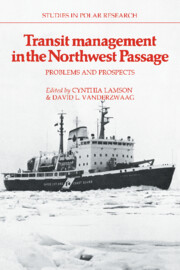Book contents
- Frontmatter
- Contents
- List of figures
- Acknowledgments
- PART I PERSPECTIVES ON THE PROBLEM
- 1 The Northwest Passage: a contrast of visions
- Post scriptum
- 2 The environment of the Northwest Passage
- 3 The development of Northern ocean industries
- 4 Arctic marine transport and ancillary technologies
- 5 Canadian arctic marine transportation: present status and future requirements
- 6 Northern decision making: a drifting net in a restless sea
- 7 Constitutional development in the Northwest Territories
- PART II PARADIGMS AND PROSPECTS
- APPENDIX: Statement on Canadian sovereignty
- CONTRIBUTORS
5 - Canadian arctic marine transportation: present status and future requirements
Published online by Cambridge University Press: 26 March 2010
- Frontmatter
- Contents
- List of figures
- Acknowledgments
- PART I PERSPECTIVES ON THE PROBLEM
- 1 The Northwest Passage: a contrast of visions
- Post scriptum
- 2 The environment of the Northwest Passage
- 3 The development of Northern ocean industries
- 4 Arctic marine transport and ancillary technologies
- 5 Canadian arctic marine transportation: present status and future requirements
- 6 Northern decision making: a drifting net in a restless sea
- 7 Constitutional development in the Northwest Territories
- PART II PARADIGMS AND PROSPECTS
- APPENDIX: Statement on Canadian sovereignty
- CONTRIBUTORS
Summary
Introduction
The future of Canadian marine transportation development in Arctic waters remains uncertain. Although proponents of the Arctic Pilot Project (APP) – a proposal to ship LNG through the Northwest Passage – have withdrawn their application from the National Energy Board, a smallerscale project involving production and transportation of oil from the Bent Horn field on Cameron Island by the marine mode is being promoted by Panarctic Oils Ltd. Beaufort Sea project proponents (Dome, Gulf and Esso) are still considering the feasibility of both tanker and overland pipelines and have not made final decisions on the preferred mode of hydrocarbon transport. The Beaufort Sea Environmental Assessment Panel, in policy recommendations to the federal government in July 1984, has cast further uncertainty over marine transportation of Arctic hydrocarbons by advising the government of Canada to withhold approval of the tanker option until the completion of two evaluation stages – general government research and preparation, and experimental testing of two Arctic Class 10 oil-carrying tankers.
If Canada chooses the marine option, will government and industry be prepared to meet the challenge? This paper examines the question of present Canadian shipping capacities and future shipping requirements from six perspectives: administration, icebreaking vessels, hydrographic knowledge, operational support services (including navigation and communications, vessel traffic management, search and rescue), crew training, and shipbuilding.
- Type
- Chapter
- Information
- Transit Management in the Northwest PassageProblems and Prospects, pp. 130 - 152Publisher: Cambridge University PressPrint publication year: 1988



